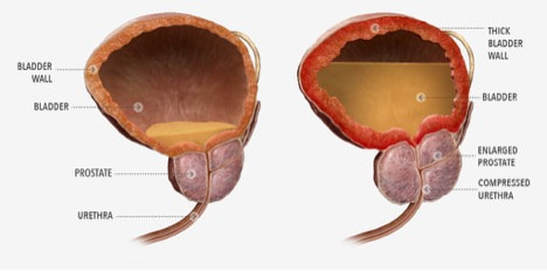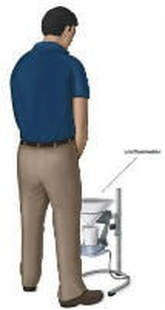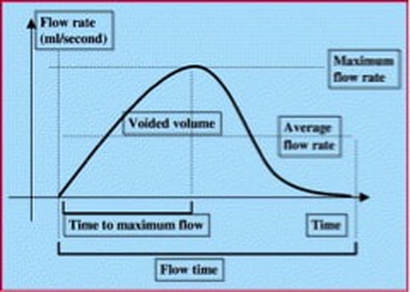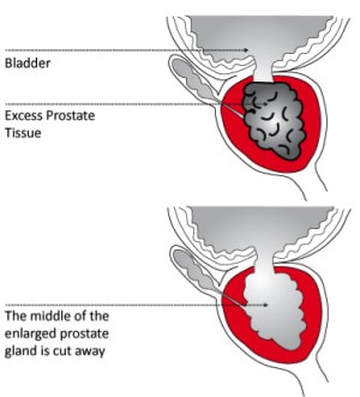BPH/Enlarged Prostate
-
BPH/Enlarged Prostate
-
Assessment
-
Treatment Options
-
Surgery
<
>
Benign Prostatic Hyperplasia, or BPH, is a condition in which the prostate enlarges as men get older. It is a benign condition and unrelated to prostate cancer; men with small prostates may have very aggressive cancers whilst men with very large prostates may or may not have any prostate cancer at all.
50% of men start to develop BPH in their 50’s, so it is very common. The likelihood of developing symptoms of BPH increases with advancing age; approximately 20% of men with BPH will progress to worsening of their symptoms, retention of urine (‘stoppage of water’), or will need surgery. BPH can greatly affect a man’s quality of life.
Complications of BPH include:
50% of men start to develop BPH in their 50’s, so it is very common. The likelihood of developing symptoms of BPH increases with advancing age; approximately 20% of men with BPH will progress to worsening of their symptoms, retention of urine (‘stoppage of water’), or will need surgery. BPH can greatly affect a man’s quality of life.
Complications of BPH include:
- Sudden stoppage of water/ Urinary retention
- Urinary tract infections
- Blood in the urine/ Hematuria
- Kidney Obstruction/ Kidney failure
- Bladder/ Kidney stones
- Bladder cancer
The prostate is a male reproductive gland, about the size of a walnut that produces fluid for semen. The prostate surrounds the urethra, which is the tube that carries urine from the bladder out of the body. As the prostate enlarges, it presses on and blocks the urethra, causing bothersome urinary symptoms such as:
- Frequent need to urinate during the day (more often than every two hours)
- Waking to empty your bladder more than once at night
- Sudden urge or need to urinate which is difficult to put off
- Weak or slow urinary stream
- A sense that you cannot completely empty your bladder
- Difficulty or delay in starting urination
- A urinary stream that stops and starts
- Straining to start the urinary stream
If you suffer from the above symptoms, you are not alone. BPH is one of the leading reasons for men to visit a urologist.
If you suffer any of these symptoms, you should schedule an office visit to be assessed for BPH. You will be given an interview and clinical examination, and blood and urine tests will be ordered. An ultrasound is usually helpful in assessing your prostate size and the presence of any complications.
We are one of the few offices in Jamaica what offer a UroFlow Meter test; the speed of your urine flow, or strength of urine, is measured by a painless, non-invasive procedure and the results are immediately available for you.
We are one of the few offices in Jamaica what offer a UroFlow Meter test; the speed of your urine flow, or strength of urine, is measured by a painless, non-invasive procedure and the results are immediately available for you.
Watchful Waiting
You may not need any treatment if your symptoms are minimal and they are not bothersome to you.
Medications
You may be a candidate for medications to manage your symptoms. These medications include alpha blockers which relax the muscles around the neck of your bladder, making it easier to urinate, and alpha reductase inhibitors which act to shrink the prostate. Medications are helpful in relieving symptoms in most men, but patients must continue taking them long-term to maintain the effects.
Patients may suffer side-effects including dizziness, headaches, dry ejaculation or other sexual dysfunction. Some may not be entirely happy with the relief of their symptoms with medication only. Over 16% of men on medication for BPH discontinue treatment early for reasons such as being dissatisfied with side-effects or not getting adequate symptom relief; these men may need surgery.
The following patients are not considered good candidate to treat with medical therapy; they are better served with survival intervention:
Failure of medical therapy to relieve symptoms, or progression of disease, or intolerance to side effects of medication
You may not need any treatment if your symptoms are minimal and they are not bothersome to you.
Medications
You may be a candidate for medications to manage your symptoms. These medications include alpha blockers which relax the muscles around the neck of your bladder, making it easier to urinate, and alpha reductase inhibitors which act to shrink the prostate. Medications are helpful in relieving symptoms in most men, but patients must continue taking them long-term to maintain the effects.
Patients may suffer side-effects including dizziness, headaches, dry ejaculation or other sexual dysfunction. Some may not be entirely happy with the relief of their symptoms with medication only. Over 16% of men on medication for BPH discontinue treatment early for reasons such as being dissatisfied with side-effects or not getting adequate symptom relief; these men may need surgery.
The following patients are not considered good candidate to treat with medical therapy; they are better served with survival intervention:
- Recurrent Urinary Tract Infection
- Bladder Stones
- Heavy Bleeding in the Urine (Hematuria)
- Renal (Kidney) function impairment
Failure of medical therapy to relieve symptoms, or progression of disease, or intolerance to side effects of medication
Transurethral Resection of the Prostate (TURP)
TURP is the most commonly performed modern surgery to treat BPH. It represents what we consider today to be the Gold Standard in surgery for BPH. Patients experience the highest satisfaction rate in long-term improvement in Urinary symptoms, with the lowest surgical complication rate, when compared to other approaches.
During this procedure, patients undergo general or regional anesthesia, and prostate tissue is removed endoscopically through the urethra (i.e. there is no ‘cut’; surgery is done through the body’s natural orifice).
TURP is the most commonly performed modern surgery to treat BPH. It represents what we consider today to be the Gold Standard in surgery for BPH. Patients experience the highest satisfaction rate in long-term improvement in Urinary symptoms, with the lowest surgical complication rate, when compared to other approaches.
During this procedure, patients undergo general or regional anesthesia, and prostate tissue is removed endoscopically through the urethra (i.e. there is no ‘cut’; surgery is done through the body’s natural orifice).
After surgery, patients wear a ‘catheter’ overnight. This is a tube inserted into the bladder that washes out any clots that may form. Usually the catheter is removed the morning after surgery if the urine is clear, and you can go home.
We advise return to light work in a week, normal activities in a few weeks, and strenuous activity after 3 months. Short-term complications that may uncommonly occur include prolonged bleeding, infection, and inability to urinate after the catheter comes out. These will usually resolve in a short time, and may necessitate repassage of a catheter temporarily.
Symptom relief from prostatic obstruction may not occur immediately, but lasts for a long time in most patients once it does occur.
There can be long-term side effects after TURP such as dry orgasm (retrograde ejaculation), incontinence (leaking of urine) or erectile dysfunction (rarely).




